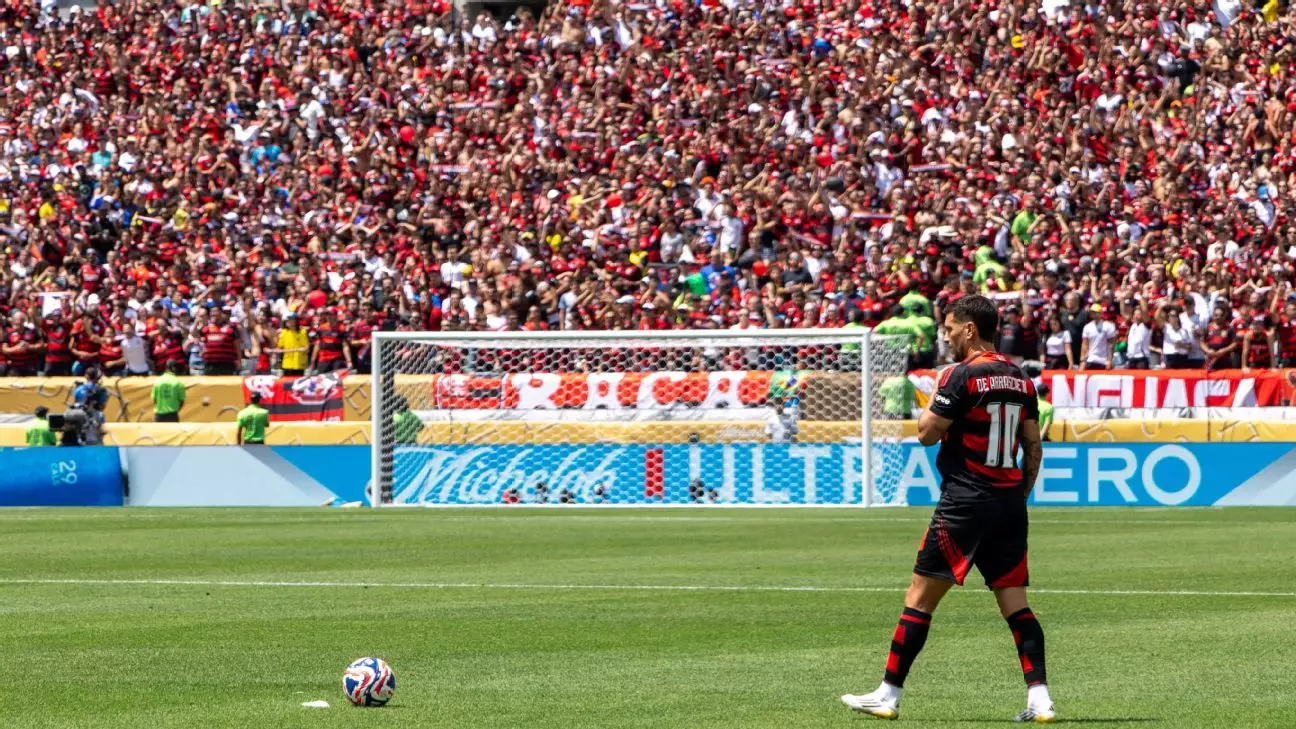Amidst the excitement of the inaugural 32-team FIFA Club World Cup, Brazil’s desire to host the next edition in 2029 is indicative of the country’s rich football heritage. This ambitious pursuit reflects not just Brazil’s status as a football powerhouse, but also the vibrant enthusiasm of its fans who thrive in the emotionally charged environment of significant tournaments. However, the competition’s current format has not been without criticism. The sweltering conditions in the hosting nation have led to game cancellations and disappointing attendance, raising concerns about whether FIFA’s ambitious vision is genuinely sustainable.
Yet, amidst these challenges, the South American teams’ resilience stands out. Their unwavering passion has proven indispensable. Football fans from Brazil and Argentina have brought vibrancy and energy to the matches, showcasing that the Club World Cup indeed holds significance. Without the formidable support from these fans, the tournament might face a serious identity crisis. Fortunately, the fervor surrounding South American teams demonstrates a cultural commitment to football that transcends the ordinary.
South America’s Footballing Heartbeat
As the tournament progresses, the results thus far provide a glimpse into the heart and soul of South American football. The exuberance of supporters is matched only by the performance on the pitch, as all Brazilian representatives—along with Argentina’s River Plate—currently lead their respective groups. Even Boca Juniors, despite sitting in third, have exceeded expectations, demonstrating the competitive spirit prevalent in South America.
The unexpected triumph of Botafogo over Paris Saint-Germain has been a highlight, evidencing the unpredictable nature of football. Meanwhile, Fluminense’s consistent performances have caught many off guard. On the other hand, heavyweights like Flamengo and Palmeiras look to solidify their projections as tournament favorites. Their focus is clear: to elevate South American football’s profile amidst the dominating narratives of European success.
The Evolution of Club Competitions
The concept of a world club competition reflects a long-standing desire to establish equivalence between European and South American football. The Copa Libertadores, which originated in 1960, was a strategic response to Europe’s leading club tournament, the UEFA Champions League. This historical context positions the Club World Cup as a haven for clubs aiming to confront the European elite directly.
However, the narrative of the Intercontinental Cup haunting South American teams—where they have often faltered—remains a pressing concern. This year, the stars have aligned favorably for them, as they participate in an international tournament mid-season, and the climate is more conducive for their playing style. This advantage of playing amidst passionate, supportive fans transforms each match into a near-home game atmosphere conducive to success.
A Tactical Showcase: Scalability of South American Teams
The tactical prowess displayed by South American clubs is a sight in itself. For instance, Flamengo recently navigated a narrow escape from elimination in the Libertadores, showcasing the management’s risk strategy. The inclusion of Jorginho has proven critical to Flamengo’s gameplay, adding a layer of sophistication in midfield that allows for fluid transitions to their talented forwards.
Palmeiras, having made significant investments into talented players, is equally exceptional. Their willingness to spend to secure victory is notable, with their acquisition of striker Vitor Roque pushing them into the record books. Coach Abel Ferreira’s systematic approach emphasizes effective defense and calculated attacks, showing that success in football isn’t merely about flair but also about intelligent game management.
On the flip side, Botafogo’s remarkable victory over PSG underlines the shift in the perception of Brazilian football. No longer is it merely an imaginative dance of skill; it underscores an evolution toward a more disciplined and strategic style of play. Their collective defensive effort against PSG debunks the myth of uncoordinated football impacting their international reputation.
Anticipation of Upcoming Battles
The road ahead is rife with challenges, but the strong performances signal a promising potential for multiple South American teams to advance deep into the knockout stages. As they prepare to face formidable European opponents, notably Atletico Madrid and Inter Milan, the stakes will be high. Each game represents a blending of pressure and opportunity as they vie for their rightful place in footballing history.
The matches promise fierce competition, with tactical adaptability and stamina being crucial. The enduring heat of Pasadena poses a further challenge, but it also presents a unique advantage for South American teams accustomed to intense climatic conditions. A gripping journey lies ahead, and with their rich history and passionate supporters in tow, one thing is clear—the South Americans are ready to make their mark on this monumental global stage.


Leave a Reply